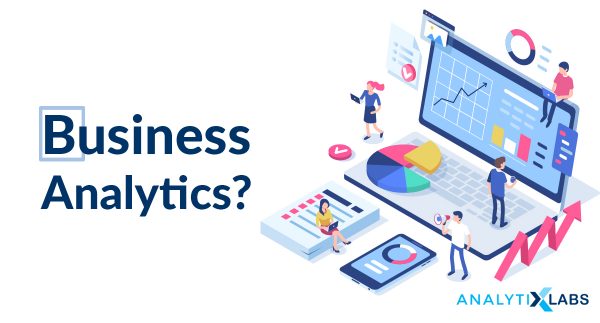Business Analyst vs Business Analytics – let us first clear the confusion!
The term “business analyst” invokes a lot of questions in people’s mind such as what exactly this field is, for whom is it suitable, what does a business analyst do and many more such questions make it difficult for a beginner to exactly pinpoint the definite definition of this field. However, the one thing that everyone seems to agree on is the importance and the ubiquity of this field, and things to learn for business analyst. The main reason that this field raises the inquisitiveness of students and professionals alike is the very nature of it which is unique on its own. This article aims to answer all such questions that might have come across anybody’s mind who has ever been curious about this field and seeking to pursue a career transforming Business Analytics Course.
Business Analysis is an umbrella term and with this blog we intent to make you understand the intricate nuances of it and how to start your career as Business Analyst. Designation of Business Analyst has found its usage in almost every industry and it is custom made for individual sectors.
- The role of a IT Business Analyst is typically responsible to coordinate with end clients and technical/ development team, assess requirements from a business perspective and enable the actions required to meet the business objectives or provide the deliverable as per client needs. A Business Analyst’s role may also involve technical project management and managing with stakeholders, internally and externally, especially in relation to design or implementation of particular tasks or projects. An IT Business Analyst may deal with very little or no data at all.
- A Business Analyst in analytics domain on the other hand mostly works with the historical data (like marketing, sales, customer, finance data etc.) and sometimes competitors’ data might be also taken into the consideration to provides insights by using data mining, MIS reporting, predictive analytics with help of statistical analysis and machine learning models.
So, before you decide on your career path, you need to be clear on where your interests lies in and one shouldn’t just decide it based on the designation name. It is important to understand what you want to do in future and pave your path keeping that in mind. Choosing a right Business Analyst course for a rewarding Analytics job, is integral.
Archish, a Data Scientist based out of Bangalore, shares his inspiring story – how he started his career as Business Analyst. With is dedication, hard-working and professional courses at AnalytixLabs he succeeded against the common notions! To his accolades, he even has a book published at such a young age.
If you are looking for career in Advanced Analytics, Data Science or Big Data Analytics then you are essentially looking for a Business Analyst training that trains you for Analytics and Data Science job roles.

It can be understood as an arm of Analytics that purely deals with all the business-related decision making. Analytics when performed keeping in mind the problems being faced at the business level such as ways to increase profit, design new products, expand to new locations, identify valuable customers and other policy and strategic problems is known as Business Analytics.
Historically, these decisions were made by the leadership of a company that based their decision purely on their experience and understanding of the current situation all of which eventually culminated into decisions often being made out of intuition sometimes also having some component of bias involved. This often led to wrong decision making, lack of transparency and other issues.
Analytics captures this idea of intuition which is nothing but implicit knowledge that can be understood by capturing and analyzing the appropriate data in the correct manner. This helps in communicating ideas on a large scale and allows for more people to participate in the decision making as the problems are solved by straight forward analytical answers.
What is a Business Analytics Certification?
Unlike traditional streams of knowledge and academics such as physics, chemistry, accountancy etc., this is a new and emerging field of study and is the reason that for having an in-depth knowledge of this stream, one needs to take up a professional Business Analytics certification course. Such a course allows the learners to understand the various aspects of this field. Ideally, good course firstly would start with making the learners understand the different types of data that are often differentiated based on the domain they belong to such as Retail, Banking, Healthcare data and also makes them understood how this data is generated, is supposed to be interpreted and the common industry-based terms found associated with such a data. Secondly, the knowledge of various tools is imparted through which such data can be analyzed. These include learning basic tools such as Excel to advanced tools such as SAS, R and Python.
The focus of a good course is then on the theoretical techniques through which a business problem is to be solved. For example, the use of certain statistical methods to correctly predict the appropriate price of a product given the demand, profit margin, utility and competition of the product. Once the theoretical and practical knowledge is provided, a good course then moves to the most important aspect which is how all of this knowledge is to be used for solving business problems. This is where the art of understanding a business problem, designing analytical solution such that it directly solves the problem or acts as a catalyst for finding the solution, creating visual friendly reports that convey the analytical results to management with ease and explain the whole problem and its prescribed solution in storytelling from comes in which is also the most important aspect of this field. A course that covers all such aspects and tests this knowledge through case studies before certifying a learner is a valuable course.
How is Business Analyst as a Career Path?

The unique aspect of Business Analyst that it doesn’t deal with any particular domain but rather it deals with the very art of business. This is the reason it has a universal appeal to it and its knowledge is in demand across all types of companies. There are businesses that run on engineering, medical, commerce, and social science expertise and this is the reason that this field is open to people belonging to all sorts of academic backgrounds and professionals from various fields. Let’s take one example from each field:
- Engineering and Construction companies require a Business Analyst to solve multiple problems. For example, a good analytical operation of data can provide insights about the sub-contractors to which the company should outsource some of the work, the performance of the workers on the ground and how their quality can be controlled and performance can be increased, identifying plausible problems that the company might face on the particular project that can be caused by logistical, productivity or other natural issues.
- Banking is a sector where competition is steep and there is always an attempt to stay ahead of the game. Analytics tools give banks an insight into their customers’ profiles, thereby allowing them to cater to them at a personalized level. It also helps the bank to minimize the chances of money laundering and other forms of financial fraud. In India, for example, the banking industry is a fast-growing sector. To stay afloat, banks are making use of data analytics to entice potential customers, retain old customers as well as us up-sell and cross-sell equities and other products.
- The pharmaceutical industry provides huge scope for Business Analysts. Strong business analytical skills are required to understand the changing trends in the scientific world and it also helps in the process of patenting new drugs and technologies. Patient history and prior medication as well as hospitalization are very integral to be able to provide proper medical care. Also, it helps in minimizing a lot of unnecessary costs for patients.
- Research companies involved in understanding the social trends such as current political leaning, opinions on various policy matters of the country, the attitude of society towards women, children and different sections of society etc., require people with expertise in analytics. Such companies play a major part in shaping public opinion, help political and other non-profit organizations for coming up with welfare schemes, etc. Such companies sometimes are also outsourced jobs by the marketing sector that help them designing their strategies and approach towards the consumers and the society as a whole. Marketing companies by themselves also employ Business Analysts for estimating and identifying a range of things such as ad market size, market trends, distribution channels, and industry cost structure and market profitability.
Therefore, a career path in Business Analyst is particularly a lucrative and exciting one as all forms of business organizations: profit, non-profit, technological, non-technological, etc. require a business analyst.
How to become a Business Analysts in 2024?

In order to become a Business Analyst in today’s time there are few things that one needs to do. Firstly, you should make sure that you fulfill the pre-requisites for learning. These mainly include having some knowledge of basic computer applications. If that is there, enrolling in a good professional course is the next logical step.
Completing the certification will give you the necessary confidence and legitimacy to apply for jobs for this position. You must also work on independent projects to prove your problem-solving capabilities, experience on business analytical tools and the expertise to apply statistical and other knowledge to come up with good insights and solutions.
Also read: Complete guide to starting your career as Business Analyst in India
Which is the best institute for Business Analytics?
As of now, in India there are no dedicated academic courses and this is the reason that these courses are largely offered by online learning platforms and training institutes. Among the common online platforms are Udemy and Coursera that provide such courses but like all online platforms suffer from the impersonal nature of their teaching.
Of the training institutes, AnalytixLabs in India provides both classroom and online courses for that cover all the theoretical and application aspect of Business analytics and lays a lot of stress on the gaining of knowledge through case studies that give the learners practical insights to the nature of job of a Business Analyst.
What is the scope of MBA in Business Analyst career track?
As a matter of fact, MBA and Analytics are highly compatible fields of study. While in MBA people learn to administer the business so that it functions smoothly, Business Analytics provides the necessary tools for it and this is the reason that increasingly in many of the MBA courses, there are mandatory modules where the analytical tools and methodologies are taught to a limited extent. Thus, people who are MBA or want to pursue it must undertake a course in Business Analytics.
Concluding thoughts
Business Analysts career is a multi-facet, dynamic and exciting choice and is the reason that people who find it important and helpful to their career must learn about it. Nowadays, almost all companies look for Business Analyst and is a good field for people having a good eye in finding patterns, understanding trends and love for uncovering truth, trends, and facts through data.
So, if you are looking to do something interesting and exciting and make an impact in the day to day working and overall success of your organization, then Business Analysts career track is the way to go. But choose a Business Analytics course which resonates with your passion and chosen field.
Also read: Business Analyst vs Data Analyst – Which one is for you?




![Top Puzzle-Questions Asked in Business Analyst Interview – With Solutions [2024 Edition]](https://www.analytixlabs.co.in/blog/wp-content/uploads/2023/08/Puzzle-Questions-for-BA-Interviews-370x245.jpg)
![[Interview Cheat Sheet] Top 35 Business Analyst Interview Questions & Answers [2024 Edition] Business Analyst Interview Questions](https://www.analytixlabs.co.in/blog/wp-content/uploads/2022/09/Business-Analyst-Interview-Questions-1-370x245.png)



1 Comment
Very informative one